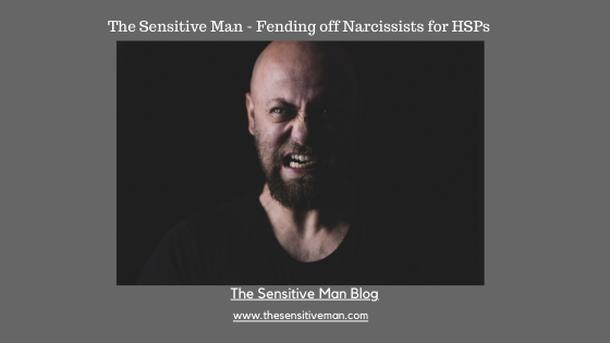|
A Blog about Sensory Processing Sensitivity from the Worldview of a High Sensing Male
There has been a lot of talk lately about narcissism and dealing with narcissistic personalities. Some very prominent people have been described as narcissistic, which has given some additional focus on this personality disorder. It has been postulated that highly sensitive people easily fall prey to narcissists, and there is good reason to believe there is truth to this claim. Because HSPs are generally very empathetic and tend to be drawn to people with problems, the narcissist can usually very easily manipulate a trusting and empathic, sensitive person. Yet, this term is often misused and overstated to describe a normal person who is situationally devious, unkind, or just emotionally manipulative. The actual percentage of the population with Narcissistic Personality Disorder (NPD), and by that, I mean consistently narcissistic, is relatively small, typically between 1-6%. Let's explore what this can mean to HSPs and for HSP relationships with narcissists. What is a Narcissist? The classic DSM-V definition for a narcissist is a personality disorder primarily characterized by a long-term pattern of exaggerated feelings of self-importance, an excessive craving for admiration, and struggles with empathy towards others. The exact causes are unclear, but evidence suggests that it is both a product of nature and nurture, part genetic part environmental. Narcissistic individuals have personality traits that display a sense of entitlement, grandiosity, and a need for attention, without much regard for others. They often show fantasies of their unlimited success or power, believe that they are special or gifted, are master manipulators, and are demonstrably arrogant. Many successful people may display some of these same characteristics. However, only the true narcissist makes the traits inflexible and maladaptive. Men tend to display this disorder slightly more so than women. Within the trait, there are several subtypes, including overt and covert narcissism. Overt narcissism is generally easier to detect because many of the NPD traits can be easily observed. Covert NPD is a bit less observable and can be more subtle and stealthy. Covert narcissists tend to be more introverted, while overt narcissists are louder, more arrogant, and outwardly disregard others. The covert narcissist more easily dupes many people because of the subtle methods of manipulation. Surprisingly, some covert narcissists are very sensitive people. I believe some HSPs are wrongly accused of being narcissistic because of HSPs' reactivity to criticisms, sudden mood changes, and the tendency towards deep thought, which appears to be aloofness. Preston Ni suggests that some classic narcissists display high sensitivity to criticism, confrontation with their self-image, rejection of their sense of entitlement, and refutation of their self-image. This reaction may add to the belief that some narcissists can be HSPs. The complicated relationship between HSPs and narcissists HSPs appear to be particularly vulnerable to narcissistic manipulation. Sensitive people's trusting and empathetic nature would make them more prone to falling to clever deception, especially from someone who cleverly builds trust first. In many narcissistic abusive relationships, a degree of co-dependency can develop between the narcissist and the victim. This dependency could more easily develop between a covert narcissist and a vulnerable HSP partner, and, at times, a narcissist can even exhibit some degree of compassion. The HSP might then harbor hope for the relationship, which only prolongs the engagement. In many ways, the HSP represents a shadow self to the narcissist, a dysfunctional compliment, the opposite other. Because HSPs love to help and aid their partners, they fall trap in the never-ending cycle of fulfilling every need for their narcissist partner. This entrapment can lead to an unhealthy symbiotic relationship and emotional pain, which the narcissist cannot relate to or feel. How to deal with a narcissist if you are an HSP If you know that you are dealing with a narcissist, understand that they will be challenging to handle and very draining to your energy levels. Avoid trying to change them and release the naïve expectation that you will be the one that does change them. Expect pushback or even retaliation if you challenge or confront them. If you must confront them, do so in the presence of witnesses. If you find yourself in a relationship with a narcissist, surround yourself with supportive people. To get out of a relationship with a narcissist, learn to set boundaries and stay firm on them. Do not take the pushbacks and attacks personally; recognize that it's their problem, not yours. This may require compartmentalizing your feelings as you deal with the confrontation. You can loop back later and deal with the emotions. Stand up for yourself and if the relationship is abusive – get distance between you and them. Be safe first. Narcissists rarely seek professional help. They don't, can't, or won't see the need for treatment, which is beyond their inflated self-image. It is often stated that narcissism is incurable; however, if the patient won't see the doctor, the treatment is useless. You can bet you won't be able to fix them, so don't try. My Personal Experiences My experiences with NPD are somewhat limited. I suspect I have interacted with individuals who display some of the traits of narcissism but not at the level of malignancy. People who act like narcissists or are narcissists, I tend to avoid – life is too short. Yet, some of these folks can be quite charismatic and alluring. People who have NPD can be cunning cult leaders and can lure many unsuspecting victims, looking for a charismatic and authoritative leader. The NPD individual feeds on the admiration and worship and designs creative manipulations to ensure their vulnerable and gullible flock's allegiance. Be wary. Anyone can fall prey. A final thought on HSPs and narcissists. In my book, Confessions of a Sensitive Man, An Unconditional Defense of Sensitive Men, I stated that I would have a hard time believing that HSPs would make effective narcissists. While I'm sure with the right combination of nature and nurture, it could happen, the core attributes of HSPs would make it difficult for sensitive people to abuse people without tremendous guilt and internal conflict. Our nature is to be empathetic, and to do less would present conflicting internal signals if we were to be ruthless and careless narcissists. Our hearts would not be faithful for long to the execution of that merciless task. Please comment about your experiences with narcissists.
0 Comments
Leave a Reply. |
AuthorBill Allen currently lives in Bend, Oregon. He is a certified hypnotist and brain training coach at BrainPilots.com. He believes that male sensitivity is not so rare, but it can be confounding for most males living in a culture of masculine insensitivity which teaches boys and men to disconnect from their feelings and emotions. His intent is to use this blog to chronicle his personal journey and share with others. Archives
July 2024
Categories
All
|



 RSS Feed
RSS Feed
